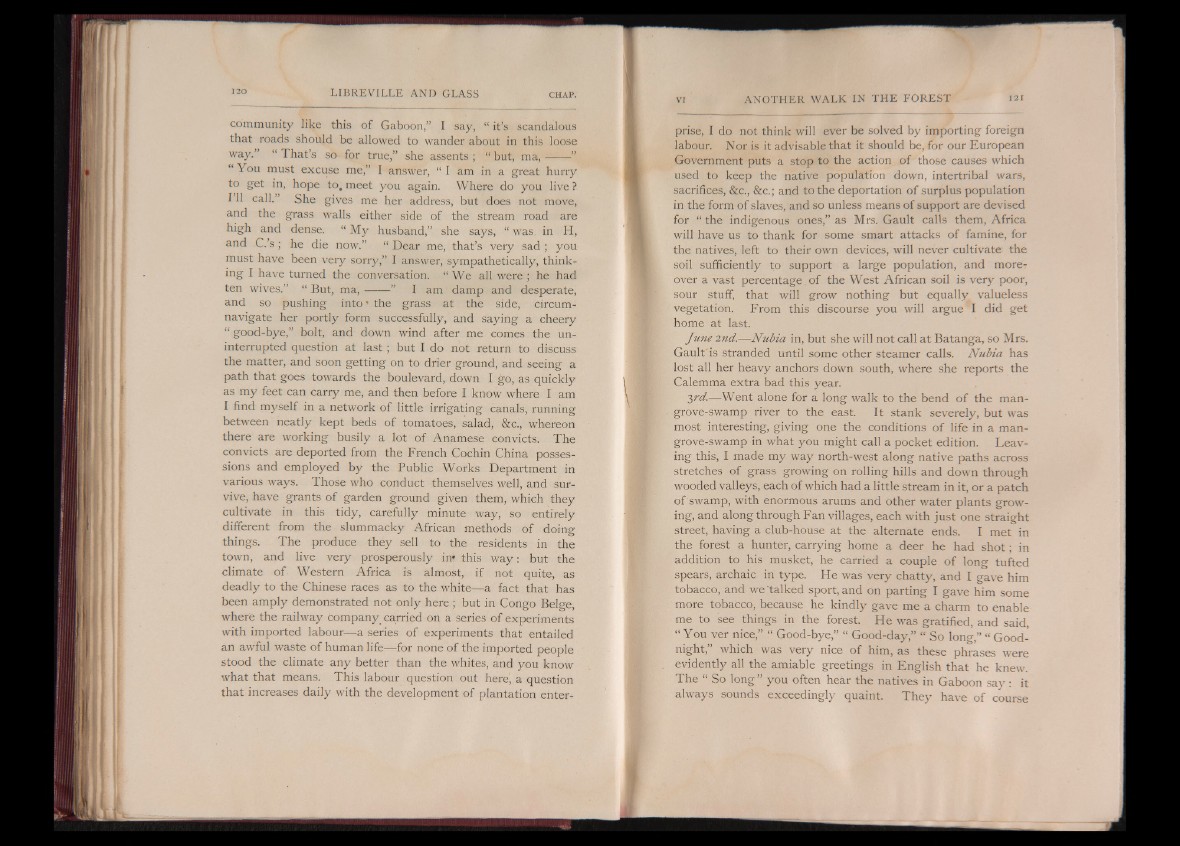
community like this of Gaboon,” I say, “ it’s scandalous
that roads should be allowed to wander about in this loose
way.” “ That’s so for true,” she assents ; “ but, ma, ”
“ You must excuse me,” I answer, “ I am in a great hurry
to get in, hope to. meet you again. Where do you live ?
111 call.” She gives me her address, but does not move,
and the grass walls either side of the stream road are
high and dense. “ My husband,” she says, “ was. in H,
and C.’s ; he die now.” “ Dear me, that’s very sad ; you
must have been very sorry,” I answer, sympathetically, think-
ing I have turned the conversation. “ We all were ; he had
ten wives.” “ But, m a , ” I am damp and desperate,
and so pushing into« the grass at the side, circumnavigate
her portly form successfully, and saying a cheery
“ good-bye,” bolt, and down wind after me comes the uninterrupted
question at la s t; but I do not return to discuss
the matter, and soon getting on to drier ground, and seeing a
path that goes towards the boulevard, down I go, as quickly
as my feet can cany me, and then before I know where I am
I find myself in a network of little irrigating canals, running
between neatly kept beds of tomatoes, salad, &c., whereon
there are working busily a lot of Anamese convicts. The
convicts are deported from the French Cochin China possessions
and employed by the Public Works Department in
various ways. Those who conduct themselves well, and survive,
have grants of garden ground given them, which they
cultivate in this tidy, carefully minute way, so entirely
different from the slummacky African methods of doing
things. The produce they sell to the residents in the
town, and live very prosperously in' this w a y : but the
climate of Western Africa is almost, if not quite, as
deadly to the Chinese races as to the white-—a fact that has
been amply demonstrated not only here ; but in Congo Beige,
where the railway company carried on a series of experiments
with imported labour— a series of experiments that entailed
an awful waste of human life— for none of the imported people
stood the climate any better than the whites, and you know
what that means. This labour question out here, a question
that increases daily with the development of plantation enterprise,
I do not think will ever be solved by importing foreign
labour. Nor is it advisable that it should be, for our European
Government puts a stop to the action of those causes which
used to keep the native population down, intertribal wars,
sacrifices, &c., &c.; and to the deportation of surplus population
in the form of slaves, and so unless means of support are devised
for “ the indigenous ones,” as Mrs. Gault calls them, Africa
will have us to thank for some smart attacks of famine, for
the natives, left to their own devices, will never cultivate the
soil sufficiently to support a large population, and moreover
a vast percentage. of the West African soil is very poor,
sour stuff, that will grow nothing but equally valueless
vegetation. From this discourse you will argue I did get
home at last.
June 2nd.— Nubia in, but she will not call at Batanga, so Mrs.
Gault is stranded until some other steamer calls. Nubia has
lost all her heavy anchors down south, where she reports the
Calemma extra bad this year.
3rd.— Went alone for a long walk to the bend of the mangrove
swamp river to the east. It stank severely, but was
most interesting, giving one the conditions of life in a man-
grove-swamp in what you might call a pocket edition. Leaving
this, I made my way north-west along native paths across
stretches of grass growing on rolling hills and down through
wooded valleys, each of which had a little stream in it, or a patch
of swamp, with enormous arums and other water plants growing,
and along through Fan villages, each with just one straight
street, having a club-house at the alternate ends. I met in
the forest a hunter, carrying home a deer he had sh o t; in
addition to his musket, he carried a couple of long tufted
spears, archaic in type. He was very chatty, and I gave him
tobacco, and we talked sport, and on parting I gave him some
more tobacco, because he kindly gave me a charm to enable
me to see things in the forest. He was gratified, and said,
“ You ver nice,” “ Good-bye,” “ Good-day,” “ So long,” “ Goodnight,”
which was very nice of him, as these phrases were
evidently all the amiable greetings in English that he knew.
The 1 So long ” you often hear the natives in Gaboon s a y : it
always sounds exceedingly quaint. They have of course